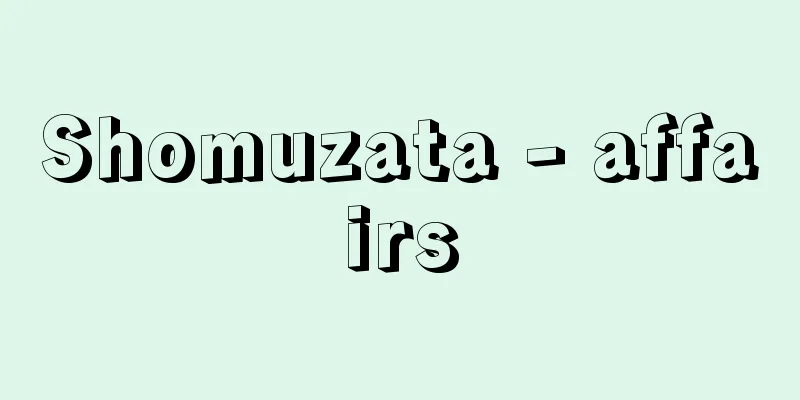Jews - Yudayajin (English spelling)

|
They belong to the Semitic language group, but are an ethnic group that has been a mixture of Hebrews and Canaanites since early times. They originally spoke Hebrew, but switched to Aramaic after the 6th century BC. The name Judea comes from the fact that they are the descendants of Judah, the son of Jacob, the patriarch in the Old Testament, but after the Babylonian captivity it became a general term for Israelites (Hebrews). The current total population is about 13 million. In addition to the State of Israel, they are scattered throughout the United States, the former Soviet Union, and European countries. [Ryuichi Urushibara] The Establishment and Development of the Jewish NationAccording to the Old Testament, immigrants from Ur in Mesopotamia, led by Abraham, entered the land of Canaan, but Jacob's family then migrated to Egypt. Eventually, they were oppressed by Pharaoh, so around 1230 BCE, they led Moses to "Exodus from Egypt." On the way back to Canaan, they made a covenant with God on Mount Sinai, centered on the "Ten Commandments," which marked a turning point for the 12 tribes to become the Israelite (Jewish) people as a religious community. They settled in Canaan while fighting against the native Philistines, and established a monarchy under Saul around 1000 BCE. The Hebrew Kingdom reached its zenith under David, who established Jerusalem as the capital, and Solomon, who built the temple, but after Solomon's death, it split into the northern Kingdom of Israel and the southern Kingdom of Judah. The Kingdom of Israel was subsequently destroyed by Assyria in 722 BCE, and the Kingdom of Judah by the Neo-Babylonians in 586 BCE. When the Kingdom of Judah fell, many of its inhabitants were taken into Babylonian captivity, but in 538 BC they were allowed to return by Cyrus II of the Achaemenid Empire of Persia, and a Jewish religious community was established centered around the rebuilt temple. After the Alexander Empire replaced Persia, it came under the control of the Seleucid Kingdom of Syria, but in 141 BC it regained its independence as a priestly kingdom under the Hasmonean dynasty after the persecution of Syrian King Antiochus IV, who launched the Maccabean Wars. When Rome eventually rose to power, it became a vassal state of Rome in 63 BC. [Ryuichi Urushibara] Dispersed around the worldIn the latter half of the 1st century BCE, under the protection of Rome, King Herod the Great ruled with an iron fist. A governor was sent from Rome, but it is well known that Jesus Christ was executed under Pontius Pilate. Among the Jews, there was a radical nationalist group called the Zealots, who were at the center of the First Jewish War, but they were defeated by Rome in 70 AD, Jerusalem was conquered, and the temple was burned. In 135 AD, they were defeated in the Second Jewish War, and the land of Judea was finally reduced to ruins. As a result, the Jews were dispersed throughout the world, which is called the Diaspora. After the loss of the temple, the nobles and priests lost their power, and it was the rabbis (law scholars) who became the leaders of the Jews. The Talmud, a system of biblical interpretation, was compiled in Babylon and Palestine as the result of their research, and is extremely important as a culmination of Jewish tradition. [Ryuichi Urushibara] Medieval JewsThe attitude towards Jews in medieval European countries was not consistent, but generally, Jews were excluded from the social institutions of the Christian world. They were not allowed to own land, and were expelled from guilds. Inevitably, they were forced to enter into financial and usury businesses, which were forbidden to Christians, and became the object of people's hatred. In the latter half of the 12th century, as the problem of heresy became more serious, persecution also extended to Jews, and Christians were strictly prohibited from being employed by Jews or living together with them. In the early 13th century, a system was started in which Jews were forced to wear discriminatory badges. Furthermore, wealthy Jews were considered a source of wealth for the king, so they were repeatedly expelled and their property was confiscated. During the Crusades, the public's prejudice and superstition against Jews amplified, and mass murders occurred throughout Europe. Ghettos (Jewish residential areas), which isolated Jews with thick walls, became widespread from the latter half of the 16th century onwards, and were established in Italy, France, Germany, Poland, Bohemia, and other places. [Ryuichi Urushibara] Jews in Modern SocietyEventually, with the trend towards civil revolutions and liberalism, the emancipation of the Jews was realized. Notable examples include the American Revolution, the French Revolution, and the unification of Germany, where Jews gained equal civil rights based on constitutionalism. However, the greatest persecution in history was carried out by the Nazi German government in the 20th century. Hitler, who came to power in 1933, advocated anti-Semitism and promoted policies such as expelling Jews from public office and excluding them from all professions. When World War II began, he forcibly sent Jews to special districts in Eastern Europe, and finally attempted to eradicate the Jews by shooting, injection, poison gas, etc. in concentration camps such as Auschwitz, Majdanek, and Belzec, resulting in the deaths of an estimated four million and several hundred thousand Jews. On the other hand, when the Jews supported the Allied powers during World War I, the British approved the establishment of a Jewish state in Palestine through the Balfour Declaration, and the Zionist movement also progressed, leading to the establishment of the State of Israel in 1948 after World War II. However, this gave rise to the so-called "Palestine problem" between the Jews and the Arabs, which became a serious international issue. [Ryuichi Urushibara] [References] | | | |Source: Shogakukan Encyclopedia Nipponica About Encyclopedia Nipponica Information | Legend |
|
セム語族に属するが、早くからヘブライ人とカナーン人とが混血した民族。元来はヘブライ語を用いていたが、紀元前6世紀以後アラム語にかわった。ユダヤの名称は『旧約聖書』中の太祖ヤコブの子ユダの子孫であることに由来するが、バビロン捕囚ののちはイスラエル人(ヘブライ人)の総称となった。現在の総人口は約1300万。イスラエル国のほか、アメリカ合衆国、旧ソ連地域、ヨーロッパ諸国に散在している。 [漆原隆一] ユダヤ民族の成立と発展『旧約聖書』によれば、メソポタミアのウルからの移住者がアブラハムに率いられて、カナーンの地に入ったが、ヤコブの一族はさらにエジプトに移住した。やがてファラオの圧制を受けたため、前1230年ころモーセに率いられて、「出エジプト」を敢行した。カナーンに戻る途中、シナイ山で「十戒」を中心として神との間に契約を結んだことは、12部族が宗教共同体としてのイスラエル(ユダヤ)民族として成立する画期となった。原住のペリシテ人と抗争しつつカナーンに定着し、前1000年ころサウルのもとで王制を敷いた。ヘブライ王国は、エルサレムを都と定めたダビデや、神殿を建設したソロモンによって全盛期を迎えたが、ソロモンの死後、北のイスラエル王国と南のユダ王国に分裂した。その後イスラエル王国は前722年にアッシリアに、ユダ王国は前586年に新バビロニアに滅ぼされた。ユダ王国滅亡の際、多くの住民がバビロン捕囚の身となったが、前538年にアケメネス朝ペルシアのキロス2世によって帰還を許され、再建された神殿を中心としたユダヤ教団の成立をみた。ペルシアにかわったアレクサンドロス帝国ののち、セレウコス朝シリア王国の支配下に置かれたが、シリア王アンティオコス4世の迫害に対してマカベア戦争を起こし、前141年にハスモン朝の祭司王国として独立を回復した。やがてローマが台頭すると、前63年その属領とされた。 [漆原隆一] 世界各地へ離散前1世紀後半にはローマの庇護(ひご)のもとで、ヘロデ大王が強圧的統治を行った。ローマからは総督が派遣されたが、ポンシオ・ピラトのもとでイエス・キリストの処刑が行われたことは有名である。ユダヤ人のなかには「熱心党」とよばれる過激な国粋主義者がおり、これが中心となって第一次ユダヤ戦争を起こしたが、紀元後70年にローマに敗れ、エルサレムは征服されて神殿も焼かれた。さらに135年にも第二次ユダヤ戦争に敗れ、ユダヤの地はついに廃墟(はいきょ)と化し、その結果ユダヤ人は世界中に離散する身となり、これをディアスポラ(離散)とよんでいる。神殿を失ったのち、貴族、祭司は力を失い、ユダヤ人の指導者となったのは律法学者(ラビ)であり、彼らの研究成果として聖書解釈の体系である「タルムード」がバビロンとパレスチナで編集されたことは、ユダヤの伝統の集大成としてきわめて重要である。 [漆原隆一] 中世のユダヤ人中世ヨーロッパ諸国のユダヤ人に対する態度は一定していないが、一般的にはユダヤ人はキリスト教世界の社会機構から締め出されていた。土地所有は認められず、ギルドからも排斥された。必然的に、キリスト教徒には禁じられている金融業、高利貸業などに進出せざるをえなかったこともあり、人々の憎悪の対象となった。12世紀の後半、異端問題が深刻化するに伴い、迫害はユダヤ人にも及ぶようになり、キリスト教徒がユダヤ人に雇われることや、同居することなどが厳禁された。13世紀初めにはユダヤ人に差別バッジをつけさせる制度が始まった。さらに富裕なユダヤ人は王にとっての財貨の源泉とみなされたため、追放と財産没収とが繰り返された。十字軍時代には、大衆のユダヤ人への偏見、迷信などが増幅され、ヨーロッパ各地で大量虐殺が行われた。ユダヤ人を厚い壁で隔離するゲットー(ユダヤ人居住地区)は16世紀後半以後本格化し、イタリアから始まってフランス、ドイツ、ポーランド、ボヘミアなどで行われた。 [漆原隆一] 近代社会以降のユダヤ人やがて市民革命と自由主義の潮流に伴ってユダヤ人解放も実現していった。アメリカ独立革命、フランス革命、ドイツ統一などが顕著な例であり、立憲主義に基づいて平等な市民権を獲得していった。しかし史上最大の迫害は20世紀になってナチス・ドイツ政府によって行われた。1933年に政権を握ったヒトラーは反セム主義を掲げ、ユダヤ人の公職からの追放、すべての職業からの排斥などの政策を推進、第二次世界大戦が開始されると、東ヨーロッパの特別区にユダヤ人を強制的に送り込み、ついにはアウシュウィッツ、マイダネク、ベルツェクなどの強制収容所で射殺、注射、毒ガスなどによるユダヤ人根絶の挙に出、その結果四百数十万人が殺害されたとされる。一方、第一次世界大戦に際しユダヤ人が連合国側を支援したのに対して、イギリスは「バルフォア宣言」によってパレスチナにユダヤ人の国家を建設することを承認、シオニズム運動も進展した結果、第二次世界大戦後の1948年イスラエル国が建設されたが、アラブ人との間にいわゆる「パレスチナ問題」が生じ、深刻な国際問題になっている。 [漆原隆一] [参照項目] | | | |出典 小学館 日本大百科全書(ニッポニカ)日本大百科全書(ニッポニカ)について 情報 | 凡例 |
Recommend
Horny teeth - Kakushitsushi
… [Vertebrate teeth] Vertebrates have two main ty...
Kallippos
…In 432 BC, the 19-year cycle discovered by Meton...
Allchin, G.
…Original hymns were also popular in the United S...
Valdivia (English spelling)
A city in south-central Chile. It is located about...
Achilles Painter - Achilles Painter
Ancient Greek potter. Active in Athens from 470 to...
Coronula diadema
...Other known barnacles include the striped turt...
Hair powder - Kamiko
…Wigs reached their largest size during the reign...
From the Upanishads to Buddhism
…He taught Sanskrit, Pali and Buddhist studies at...
Motoori Harumura
1767‐1836 (Meiwa 4‐Tenpo 7) The second son of Moto...
Andreevski, PM - Andreevski
…Official name = Republic of MacedoniaRepublika M...
emery
…Specific gravity: 4.0-4.1. A complex mixture of ...
Dur Kurigalzu
A ruined city about 20km west of Baghdad, Iraq. It...
Ruler (ruler) - Ruler
A ruler is a measuring instrument that measures le...
Pseudo door - Gihi
...A niche was carved on the east side, where fun...
Marbled - Shimofuri
It is meat with fine fats in a marbled pattern be...

![Higashinaruse [village] - Higashinaruse](/upload/images/67cc99a9eaed3.webp)







